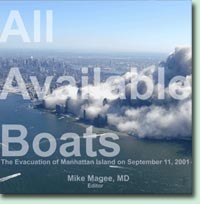Parkland Teens Teach “Positive Leadership”!
Posted on | February 28, 2018 | Comments Off on Parkland Teens Teach “Positive Leadership”!
nbcnewyork.com
Mike Magee
At this time of year my wife and I always try to see the movies nominated for an Academy Award. Recently we saw Darkest Hour, up for Best Picture as well as a Best Actor nod to Gary Oldman in his role as Winston Churchill. The film begins with Dunkirk and the historic private flotilla evacuation which Churchill directed as his advisers were defining the move as a hopeless cause and insisting that Britain’s only option was to surrender to the overwhelming German forces.


As I viewed those opening scenes, I couldn’t help but be reminded of a the maritime evacuation of Manhattan Island on 9/11 – 300,000 evacuated by mostly private vessels responding to a Coast Guard call for “All Available Boats” – documented in a book by the same name. But it was not only the vessels and rescues that drew the comparison but Oldman’s performance itself which reminded me that in times of crisis, such as the recent Parkland shootings, leaders must emerge who are unafraid and determined to guide us through to safer shores.
We are currently being challenged by destructive change and negative predatory leadership. Change is one of the few human conditions that can simultaneously support two diametrically opposed human emotions, fear and exploration. Change is the critical lever in leadership. Pull it one way and you create a positive leader. Pull it the other and you create a negative leader.
Negative leaders are short-term thinkers who use fear as a currency to herd people together and move them in whatever direction suits their needs. It is a short term, successful strategy, but suffers from a critical weakness, and that is that heightening fear causes people to retrench, reinforcing old beliefs and behaviors, naturally segregating segments of society, reinforcing silos and resisting change. In the short and medium term, fear can hold a population in place, even as the world around them continues to change. But the inability to evolve, to stay in step with or ahead of a changing world, insures that negative leaders will eventually fail.

In contrast, positive leaders like the Parkland high school students view change as exploration, and lead with vision rather than fear. Their view is longer term and they reach out across the divide. Rather than segregate, they congregate. Rather than build walls and silos they build islands of common stewardship.
As the Parkland shooting and its aftermath well illustrated this week, Americans currently live in fear. Why should this level of fear concern us? Well first, fear is the currency of negative leaders, and they are more likely to emerge and succeed in a fearful environment. Second, fear undermines trust, and trust is the fabric of a civic society. Third, fear clearly has short and long term mental health implications. Fourth, fear accumulates, especially in those who are already fearful. Post 9/11 studies showed clearly that fear biased women and minorities. Finally, fear obstructs vision, actively discouraging imagination, innovation and hopefulness. In compromising our wonder and inventiveness, fear fundamentally alters our collective future.
The Parkland teens, with their family’s support, and the coalescent of high schoolers across the nation this week have taught us all a thing or two about how to manage fear. First, they have identified, nurtured, and advanced individuals with the values and temperament to become tomorrow’s positive leaders. Second, they have incorporated fear management into their academic curriculum. Third, they reinforced the value that human beings should never remain silent in the face of evil. Forth, they have honored the ties between individual, family, community, and society; and in the process personalized and individualized their efforts in a manner that honors diversity and respects cultures. Fifth, in confronting the NRA, they have embodied the belief that judgment is at least as important as decisiveness, and that militarizing America is a poor judgment which ensures faulty decisions under stress.
People are basically good, but they are not perfect. People are basically kind, but when afraid they may act unpredictably. People are basically loving, but when misled respond with hatred and contempt. People are people. That is why we must continue to devote as much time and energy to the preparation for peace as you do for the preparation for war. For our homeland will never be secure if fear has so weakened the fabric of our society that we lose the capacity to be human and humane toward each.
#2018 Election.
Tags: All Available Boats > Dunkirk > negative leaders > NRA > Parkland shootings > positive leadership > trump


